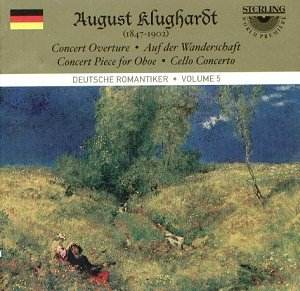Born
in Cöthen in 1847 Klughardt’s life was suffused in musicality.
A piano soloist at sixteen (Mendelssohn’s G minor no less) his
studies took him to Dresden and to his teachers Blassmann and
Reichel - with whom he studied counterpoint. His early twenties
saw him on the move as a provincial conductor – he took a number
of successive posts around the country – whilst also keeping up
the piano. But it was composition that occupied him more and more
and the early grounding in Schumann became, over time, augmented
by admiration for Liszt, whom Klughardt knew, and Wagner, whom
he met at the first performance of Liszt’s Christus. Though he
was later to enshrine elements of Liszt’s tone poems in his own
works – which include a large number of piano miniatures, two
symphonies, a violin concert and a raft of chamber works – the
pieces on this disc, all derived from radio performances, reflect
much more the early rusticities of his Schumannesque musical persona.
These
are all attractive, well crafted and constructed with surety.
They are also attractively lyrical and ardent in a definably restrained
way. There are no undiscovered masterpieces but equally there
are some attractive discoveries. The Konzert-Ouverture has some
fine hieratic mountain top horn calls, some moments of contrapuntal
confidence (shades of Reichel) and plenty of nature poetry from
the School of Schumann – plenty of zest, plenty of good, honest
orchestration. The Konzerstück for Oboe and Orchestra is
a generous, verdant nine-minute affair, if somewhat conventional
in actual layout. There’s certainly room for attractive cantilena
in the slow section and the puckish oboe figures – contrasted
with the rather phlegmatic orchestral responses – enliven the
finale. The Cello Concerto is, in the spirit of the times, a single
movement, and multi-sectional one lasting eighteen minutes. It
was premiered by Julius Klengel in Dresden in 1894, the composer
conducting. Klengel was, with Hugo Becker, the leading cellist
in Germany and one of the most significant string players of the
day and it was a signal honour for the composer. Klengel was also
principal cellist of the Gewandhaus, a position he held for not
far short of forty-five years – maybe Klughardt’s early Dresden
connections paid off. The work is decidedly Schumannesque, full
of eloquent lyricism with a tune so delicious that Klughardt reprises
it almost immediately, this time varnished by pizzicati lower
orchestral stings – a miscalculation but an understandable one;
if you write a tune that good you want to hear it again. It would
have been better, though, to have embedded it as reminiscence
at the end of the work.
Auf
der wanderschaft is a six-movement suite of a decidedly verdant
kind. There’s plenty of nature painting in the opener, avian winds,
sturdy horn calls, all forest and stream. Der Jäger, the
fourth movement, is especially vibrant – hunting horns this time
and bird calls in sprightly collision. There’s a big boned waltz
as well – let’s not forget the dance floor – that leads straight
into the Gute nacht final movement; wistful, explicitly
Dvořákian and full of wind tracery. The Schumann melos is
still with us here though, warmly affectionate and ever lyrical.
The
recordings are getting on a little but they sound quite acceptable.
If your fancy leads you to the fringes of the Romantic repertoire
– don’t expect Brahms, much less Bruckner – I think you will find
Klughardt congenial company.
Jonathan
Woolf
